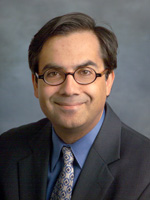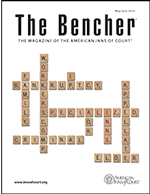Proposed Ethics Rule on Harassment and Discrimination in Conduct Related to the Practice of Law
The Bencher—May/June 2016
By John P. Ratnaswamy, Esquire

 The 2016 Annual Meeting of the House of Delegates of the American Bar Association is expected to address a proposal to amend ABA Model Rule of Professional Conduct 8.4 and its Comment [3] relating to discrimination and harassment in conduct related to the practice of law.
The 2016 Annual Meeting of the House of Delegates of the American Bar Association is expected to address a proposal to amend ABA Model Rule of Professional Conduct 8.4 and its Comment [3] relating to discrimination and harassment in conduct related to the practice of law.
ABA Model Rule 8.4 is entitled Misconduct. Existing Comment [3] to Rule 8.4 states:
[3] A lawyer who, in the course of representing a client, knowingly manifests by words or conduct, bias or prejudice based upon race, sex, religion, national origin, disability, age, sexual orientation or socioeconomic status, violates paragraph (d) when such actions are prejudicial to the administration of justice. Legitimate advocacy respecting the foregoing factors does not violate paragraph (d). A trial judge’s finding that peremptory challenges were exercised on a discriminatory basis does not alone establish a violation of this rule.
Existing Comment [3] was added in 1998 after several years of proposals and discussion.
On December 22, 2015, based on work that began in 2014, the ABA’s Standing Committee on Ethics and Professional Responsibility issued a memorandum explaining and presenting for review and comment a proposal to amend Rule 8.4. The proposal, at that time, was drafted to add a new subsection (g) to Rule 8.4 that would add to the list of actions that constitute misconduct: “(g) in conduct related to the practice of law, harass or knowingly discriminate against persons on the basis of race, sex, religion, national origin, ethnicity, disability, age, sexual orientation, gender identity, marital status or socioeconomic status.” The proposal also included a new Comment [3]. That version of new Comment [3] is too long to quote here, but it included a statement that paragraph (g) “does not apply to conduct unrelated to the practice of law or conduct protected by the First Amendment.” See https://www.americanbar.org/content/dam/aba/administrative/professional_responsibility/rule_8_4_language_choice_memo_12_22_2015.authcheckdam.pdf
The standing committee’s review of this subject was prompted by a May 2014 letter to the Committee from the ABA’s “Goal III” Commissions. A major factor in the resulting proposal is a desire to move the subject from Comment [3] to the Model Rule itself. Comments have a lesser status in the Model Rules than the Rules. Paragraph 14 of the Scope provision of the Model Rules states in part: “Comments do not add obligations to the Rules but provide guidance for practicing in compliance with the Rules.”
The standing committee held a public hearing on the proposal on February 7, 2016, at the ABA Midyear Meeting. The public hearing generated comments on both the substance and the drafting of the proposal. A number of speakers, including ABA President Paulette Brown, encouraged the standing committee to make the proposal broader in certain respects. Among the topics discussed were whether the language added to the Model Rule should be limited by the term “knowingly”, and whether the definition of the practice of law should include activities at law firms such as social events. The standing committee also asked for written comments on the proposal by March 11, 2016.
The standing committee will review the comments at the public hearing and the written comments. I imagine that the committee then will revise both the proposal and the supporting memorandum. Other ABA entities will weigh in, pro, con, and/or on drafting.
The final proposal will be presented to the House of Delegates at the ABA’s 2016 Annual Meeting. It seems likely, however, that there will be additional opportunity for review and comment, and possibly negotiation, before the Annual Meeting.
John Ratnaswamy is a partner in the Chicago law firm of Rooney Rippie & Ratnaswamy LLP. He also serves as an Adjunct Professor of Legal Ethics at the Northwestern University School of Law. He is a former member of the American Bar Association’s Standing Committee on Ethics and Professional Responsibility and a current member of the Hearing Board of the Illinois Attorney Registration & Disciplinary Commission. This column should not be understood to represent the views of any of those entities or John’s or the firm’s current or former clients.
© 2016 JOHN P. RATNASWAMY, ESQ. This article was originally published in the May/June 2016 issue of The Bencher, a bi-monthly publication of the American Inns of Court. This article, in full or in part, may not be copied, reprinted, distributed, or stored electronically in any form without the express written consent of the American Inns of Court.